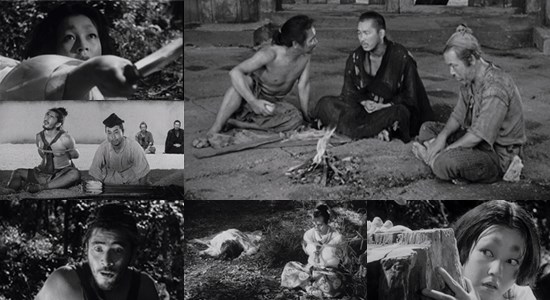
Written by Hayley Scanlon on 18 Sep 2015
Distributor BFI • Certificate 12 • Price £19.99
When it comes to the history of Japanese cinema in the West, you’d be hard pressed to come up with a more important title than Akira Kurosawa’s Rashomon. A moderate success in Japan, it did well with audiences and critics, though its producers Daiei had their doubts regarding the picture’s complicated setup and were not always supportive to its production. In fact, the reason it managed to travel overseas at all was largely thanks to the efforts of Giulliana Stramigioli, the head of Italiafilm’s Japanese office who managed to ensure Rashomon was entered into the 1951 Venice film festival where it shocked the world by walking off with the top prize. From thereon in the door was open for Japanese cinema outside of Asia, where it continued to dominate the art house market for years to come.
Launching a cultural phenomenon in its own right, Rashomon is story which probes at the nature of truth, perception and delusion through examining several witness accounts of the same crime. Inspired by two stories by one of the best known figures of Japanese literature, Ryunosuke Akutawa - Rashomon and In a Grove - the facts are as follows: a samurai is dead and a bandit has been arrested for his murder. We pick up the story listening to two of the puzzled witnesses to the case as they take shelter from a heavy rainstorm under the Rashomon gate and recount their strange day to a third man who comes walking by and starts ripping off bits of wood from the gate itself to build a fire. The woodcutter says he found the body in the woods, the priest says he saw the samurai and his wife travelling shortly before the incident.
At the trial, the bandit says he was struck by the wife’s beauty and decided to rape her even if he had to kill the husband (though it would be more fun not to) but that after he’d raped her she was overcome with shame and wanted the two men to duel to the death to prevent her from having the suffering of two living “husbands”. He says he killed the samurai in a duel.
The wife says that the bandit ran off after raping her but that when she freed her husband he looked at her with such loathing that she eventually asked him to kill her until she fainted with a dagger in hand only to wake up and find the same dagger in her husband’s chest. She then ran to a temple for sanctuary.
Then we hear from the dead man himself via a shaman who claims that the bandit offered to take his wife with him and she agreed but asked him to kill her husband first. Then the wife ran off and the bandit let him go whereupon he killed himself.
Actually, there’s yet another version too, but you can see that none of these accounts share much in common and cannot possibly all be true. What really happened, who is telling the truth and who is either lying or reconstructing events to suit their own way of seeing things is, in the end, beside the point. The point is that you can’t rely on others to speak the truth, and that “truth” itself is a fairly nebulous concept that is always polluted by the fallacies of memory and of personal perception. Through recounting their confusion and debating the case, the three men sheltering from the storm meditate on the implications of their discovery. The third man, a commoner, is the most cynical of the three and insists that men are only motivated by self-interest and is therefore not surprised that everybody is lying in order to make themselves look “better”. The priest is heartbroken by this turn of events and has his faith in humanity shattered - how can he go on living if the world is as wicked as this and things like honesty and morality no longer have any value? The woodsman stands somewhere in the middle, ordinary, basically good but fallible and wanting to do better.
Whether actively lying as we would understand it, simply deluding themselves into seeing events in a way which makes them feel more comfortable, or just mistaken in their recollections, no one person’s account can accurately reflect the real truth of events and so it follows that each additional account differs from those which precede it and serves only to add more confusion and misinformation. For Kurosawa this is the real “truth” that he aims to expose; that human beings are incapable of being honest even with themselves let alone with others, and will always tailor their recollections to best fit their own particular needs.
Finally arriving in HD in the UK from the BFI, this Blu-ray edition boasts a pleasing HD transfer based on the 2008 restoration and is a fine opportunity to revisit this well regarded classic of Japanese cinema. As mysterious and thought-provoking as ever, Rashomon asks serious questions about the nature of truth and humanity, but you’ll have to supply the answers for yourselves.
Available as separate DVD and Blu-ray releases.
Japanese with optional English subtitles. On-disc extras include new audio commentary by Kurosawa expert Stuart Galbraith IV, Rashomon at 65 documentary, John Boormon on Rashomon and the set also includes a booklet featuring an essay by Stuart Galbraith IV plus photos and full credits.
posted by Richard Durrance on 03 Feb 2026
posted by Richard Durrance on 27 Jan 2026
posted by Richard Durrance on 19 Jan 2026
posted by Richard Durrance on 08 Jan 2026
posted by Richard Durrance on 17 Dec 2025
posted by Richard Durrance on 12 Dec 2025
posted by Ross Locksley on 09 Dec 2025
posted by Richard Durrance on 28 Nov 2025